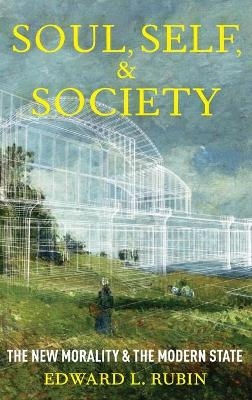
State, Soul, and Society
Oxford University Press Inc (Verlag)
978-0-19-934865-7 (ISBN)
Given the complexity of human societies, the idea that a society's moral norms track the stages of its historical development is both controversial and difficult to demonstrate. Yet in The New Morality, Edward Rubin, an eminent scholar of the modern state, offers an ambitious account of how current moral norms are inherently connected to the type of state that currently dominates the developed world. He contends that the moral system of 'self-fulfillment'--the idea that people are entitled to the most pleasurable and meaningful life possible, without unnecessary constraints--that has emerged in the last two centuries parallels the rise of the modern administrate state. The modern state's functions--education, unemployment relief, health, and environmental protection, among others--are designed to support that moral system. However, just as the rise of the administrative state generated tensions as it replaced an older state model, self-fulfillment has created stresses because it has gradually supplanted the pre-existing moral code: the religiously based morality of higher purposes, which demanded that people serve God and king. This moral system tracked the rise of centralizing monarchies in Western Europe, and that system in turn replaced a morality of 'honor,' which dominated in the pre-absolutist era where governmental power was private in orientation and the state was weak. Rubin traces how paired state-moral system models have emerged and withered over time, paying close attention to the stresses that emerge when a new order replaces an existing one. He provides a close analysis of the components of the morality of self-fulfillment, exploring sex, pleasure, friendship, hobbies, careers, voting behavior and public obligations. Our entire system of government, he argues, is bound up in this morality, and its primary purpose is to further it. A sweeping, big-idea book in the vein of Richard Sennett's The Fall of Public Man and David Riesman's The Lonely Crowd, The New Morality promises to reshape our understanding of the ultimate aims of modern politics and society.
Edward Rubin grew up in Brooklyn, N.Y., received his undergraduate degree from Princeton and his law degree from Yale. He clerked on the Second Circuit, briefly practiced entertainment law, and joined the Berkeley Law School faculty in 1982. He move to Penn Law School in 1988 and then to Vanderbilt Law School in 2005, where he served as Dean. As an educator, Rubin has championed curricular reform; as a scholar, he has authored numerous books, articles and edited volume, many devoted to the reform and modernization of legal institutions.
Introduction ; The Thesis ; An Illustration: The 2012 Election ; Plan of the Book ; The Boundaries and Limits of the Thesis ; Part I: Origins of the New Morality ; Chapter 1: The Morality of Honor ; The Privatization of Government in the Roman Empire The Privatization of Governance in Early Medieval Europe The Morality of Honor and the Man of Honor ; The Man of Honor in Action The Morality of Honor and Other Members of Society ; The Co-Causal Connection ; Chapter 2: The Morality of Higher Purposes ; The Publification of Governance ; The Monarchy as a Higher Purpose of Its People and Government ; The Spiritualization of Christianity ; The Morality of Higher Purposes ; Sexual Love as a Higher Purpose ; The Co-Causal Connection ; Chapter 3: The Morality of Self-Fulfillment ; The Idea of the Administrative State ; The Advent of the Administrative State ; Self-Fulfillment Morality: The Process of Secularization ; Self-Fulfillment Morality: The Concept of Mental Health ; The Co-Causal Connection ; Resistance to the New Morality ; Part II: The Nature of the New Morality ; Chapter 4: The Morality of the Self ; The Basic Principle: The Self as a Life-Path ; The Basic Principle: Fulfillment as Pleasure, Planning and Reflection ; Secondary Principles: Non-Interference, Incommensurability and Equality ; Components of the Life Path: Careers ; Components of the Life-Path: Family, Religion and Leisure ; The End of the Life-Path ; Chapter 5: The Morality of Intimate and Personal Relations ; The Validation of Sex ; The Reformulation of Childhood Sex ; The Deregulation of Sex ; The Domestication of Love ; The Personalization of Parenthood ; The Personalization of Friendship and the Officialization of Work ; Chapter 6: The Morality of Relations with Society ; The Self's Relation to the Nation-State ; The Morality of Self-National Relations ; The Non-Interference Principle and Negative Rights ; The Equality Principle and Positive Rights ; Moral Action Beyond Voting: Reiteration and Emergent Consequences ; The New Morality and Environmentalism ; Conclusion: The Future of Christianity ; Christianity and Western History (Chapters 1, 2 and 3) ; Christianity and the New Morality of the Self (Chapter 4) ; Christianity and the New Morality of Personal Relations (Chapter 5) ; Christianity and the New Morality of Relations with Society (Chapter 6) ; A Final Word
| Erscheint lt. Verlag | 2.4.2015 |
|---|---|
| Verlagsort | New York |
| Sprache | englisch |
| Maße | 177 x 238 mm |
| Gewicht | 776 g |
| Themenwelt | Geisteswissenschaften ► Philosophie ► Ethik |
| Sozialwissenschaften ► Politik / Verwaltung ► Politische Theorie | |
| ISBN-10 | 0-19-934865-0 / 0199348650 |
| ISBN-13 | 978-0-19-934865-7 / 9780199348657 |
| Zustand | Neuware |
| Haben Sie eine Frage zum Produkt? |
aus dem Bereich


